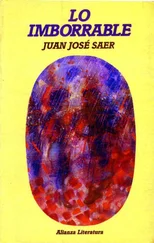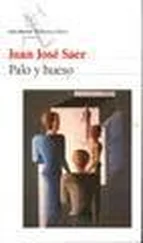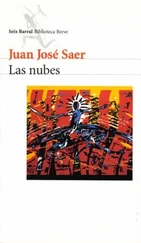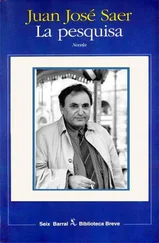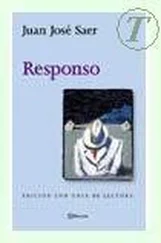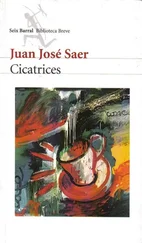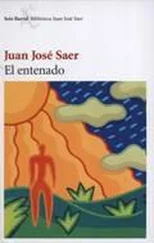It became clear to me that I had to immediately impose my authority on the band of horsemen, their dark eyes scrutinizing me, undecided, from the shadow of the military cloaks that protected them from the rain; with a firm but friendly voice I asked who led the group, to which a man dismounted in silence and removed his hat, but didn’t uncover his head, which was wrapped in a sort of red handkerchief tied at the nape of his neck, and made as if to hand me a leather pouch, but I ignored the gesture and asked him to come inside. Without inviting him to sit down, I had him spread the contents of the pouch onto a wicker table that stood in the hall, which consisted of several letters addressed to me from Dr. Weiss and some medical and financial documents. In the letter addressed to me, I was informed that the bearer of the same, which is to say the man with the red handkerchief, was a reliable servant of the Troncoso family, who desired that I allow him to accompany us to Casa de Salud as the patient’s personal guard. Although it seemed an excellent idea to me (later events would prove my error), I pretended to think for a moment before accepting, and even permitted myself to explain to him, with exaggerated seriousness, the state of his master’s health, advising him that, if he wanted to be part of our caravan, he must keep in mind that I was speaking of a mobile hospital and not a company of soldiers or ranch hands, and that in hospitals it was generally doctors who gave the orders. The man listened, unblinking. He must have shaved that morning, and he had the dark skin common to those who live and work in the elements. His fealty to Troncoso seemed to tug at him, and so did the convincing tone that lent my speech professional authority. If some doubt remained about the state of the man he was supposed to protect, subsequent episodes in our travels would do away with it. The man was loyal and well intentioned toward his master, but a little lacking in spirit despite his fierce freebooter aspect. His name was Rosario Suárez, but since Troncoso called him El Ñato, or Pug-Nose, everyone called him by that nickname. He had a dog-like loyalty to Troncoso, despite the fact that Troncoso often treated him with indignity, not out of madness but because of his role as master.
Four days later, the wagons arrived from Paraguay. Though expected for weeks, their appearance produced a great commotion in the city; they had been joined by several merchants and even a troupe of actors, so for several days a sort of fair took place on the edge of town where the caravan had settled, as the mud kept it from reaching the city center. The wealthy families traveled to the outskirts to do their shopping; two or three carts were down from Asunción, and one even from the Brazilian coast carrying goods that were commonly used, but terribly scarce in the cities of the Viceroyalty, owing to Madrid’s trade monopoly over the colonies. In those years, one had to resort to contraband to access such goods; even the city merchants would come to shop and supply their own businesses. Ladies and gentlemen from town came to get a taste of the poor neighborhoods, accompanied by slaves bearing packages or holding up large umbrellas, black as the hands that clutched stoically at curved handles to keep them aloft over their masters’ heads to protect them from the rain. A troupe of actors tried to enliven the atmosphere, but the weather was so bad that it became impossible to act outdoors, so they were finally invited to give a show at the Casa de Gobierno, where they performed a coarse and disjointed farce that, for some mysterious reason, garnered enthusiasm among the city elites and dominated conversation for days.
While it lasted, one of the main attractions amid the bustle was Troncoso himself, who found in that impromptu fair the ideal venue for his irresistible taste for performance, playing the role of an elegant, witty man, chatting with one and all, and so ostentatious he could not be missed. He had grown calmer shortly after our first meeting, perhaps when he realized, as the days passed, that I had no intention of being either his enemy or his assassin, and if his behavior was indeed rather striking, it did not seem to stray too far from the usual, and people regarded him as an entertaining and slightly extravagant man, whose strong accent told of his Córdoban origins. It was known that he suffered some vague infirmity, though his ceaseless activity must have convinced more than one that it was an unfounded rumor. He lived lavishly, which enhanced (obviously) the number of his admirers in the city’s only inn. I called on him daily and we spoke amiably, barely touching on — and not without innuendo — the edges of his eccentricity, but when he saw me arrive at the fair, where he was having almost more success than the smugglers and actors, he would vanish discreetly, perhaps out of fear that I would assert my medical authority and humiliate him in public. By revealing that connection to reality, he eased my concern, though only to an extent; experience has generally proven that, beneath that deceptive meekness, frenzy often grows impatient.
This brings me to my two new patients, who, along with the guard that accompanied them and the other members of the caravan, had to negotiate an incredible series of obstacles to arrive in the city. The patient we were expecting, about whom letters had been exchanged between Asunción and Las Tres Acacias, was a man some thirty years old called Juan Verde, a relative of the owner of the transport company that had rented the wagons to the patients’ families for such a reasonable price. The man would go from hesitant silence to overly-lively or impassioned conversation, which, oddly, tended to consist of a single sentence. He repeated it constantly, changing his intonation and adding such varied facial expressions and gestures that it was as if he were indeed holding a conversation with his interlocutor in which, as spoken sentences changed, so changed the feelings and passions that spurred them. To be clear, I should state that what Verde always said was not even a sentence, as it had no verb, but consisted of the expression morning, noon, and night , which he addressed to his interlocutor, and sometimes even to himself in the course of the conversation, always repeating it and changing only the intonation, which at each exchange would suggest such distinct things as greeting, courtesy, astonishment, joy, anger, disagreement, concentration, interest, et cetera. That curious form of speech, which ultimately wore on his interlocutors, as one might guess, alternated, as I have said before, with many hours of hesitant silence each day. As for the unexpected patient, I must admit that all his papers were in order when they entrusted him to me on arriving in the city. He was Verde’s middle brother, son of the same father but not the same mother, and as he was much younger (he would have been fifteen or sixteen at most), all members of the caravan, to distinguish between them, and with certain affectionate familiarity, began to call him Verdecito, or “little Verde.”
Since antiquity, many causes of madness have been posited, varying by the type of illness under discussion, and so, when multiple cases appear in the same family, not only in parents and children but even over generations — or as they seemed to occur in the Verde family, in the same generation — the suspicion that hereditary factors exist in certain cases of insanity seems more than justified. Without being quite identical, the Verde brothers’ symptoms displayed many similarities, particularly in a sort of perversion of speech; it did not manifest the same way, but still drew attention. (Dr. Weiss noticed the phenomenon immediately, and he tried to make an inventory of the two brothers’ shared symptoms, as well as their divergent traits, in order to establish a classification principle for both. I will not rest on these details too long because, as the reader will recall, the object of this memoir is not to enter into scientific minutiae.)
Читать дальше



